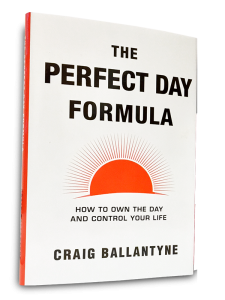12 Steps to Controlling Your Life

There are two types of people in this world: Successful people and people who struggle.
What’s the difference?
People who struggle are RE-active. Successful people are PRO-active.
Here’s a perfect example of someone on the RE-active end of the spectrum:
Frank is always getting up late. He hits snooze every morning, then spends a few minutes in bed checking social media. Next thing he knows, 20 minutes have passed, so he has to rush to get the kids ready. Finally, he races off to work—but not before grabbing a coffee-and-a-donut sugar-and-caffeine bomb for breakfast.
The chaos and frustration of Frank’s day doesn’t stop there. He invariably gets stuck in traffic, and he slides into work a few minutes late. In a frenzy, he dives right into checking email, phone messages, and social media (again). Predictably, this makes him unprepared for morning meetings.
By late morning, Frank is hangry (hungry + angry). Why? While his sugar and caffeine breakfast was great for a quick energy spike, his blood sugar inevitably crashes, leaving him with fatigue and frustration by lunch. This vicious cycle causes him to rush out to Burger King for a whopping meal of processed carbs, sugar, and caffeine (again). Yet despite the cola, Frank is nodding off in his chair by 2pm.
The day isn’t over, though. At 4pm, he finds himself fighting soul-crushing deadlines because his day has been marked by constant frenzy and very little production.
How much do you think Frank has crossed off his to-do list?
Let’s be honest. He’s gotten almost nothing done.
If he’s lucky, Frank makes it home only an hour late, missing family dinner and his children’s soccer practices and piano recitals. He barely has time to say goodnight to the kids before they sulk off to bed.
Here’s the cherry: Exhausted by the day, Frank begins to bicker with his wife about things he didn’t get done around the house, then plops down in the living room lounger and spends two hours watching TV before falling asleep in front of reruns of “The Simpsons.”
And guess what? Frank will get up tomorrow and do it all over again. It’s “Groundhog Day on Elm Street.”
One of the worst parts of this scenario is that re-active individuals like Frank have a tendency to blame others for their own struggles, avoiding personal responsibility. That’s why the cycle repeats itself.
Do you know someone like this?
Do YOU have any of these low-performer habits?
You might not have all of these, but even if you have a couple of bad habits, they can pull you down and prevent you from becoming the person you know you can be.
Now let’s jump to other side…
Successful people are PRO-active.
They take personal responsibility for who, what, and where they are in life.
And it’s not just because they get up on time, never hitting snooze, and spend some time on their #1 priority in life.
Whatever they do, they do it because it matters, it’s a priority, and they know that if it gets done, they’ve started winning the day.
They are ready for that moment when everyone else gets up. There is a plan for the family to eat healthfully—while eating together if possible—and for getting everyone to where they need to be on time.
They get to work prepared, not stressed. They focus on what matters before getting sucked into the chaos of emails and calls. They reserve social media time as a reward to be enjoyed on a break later in the day, and only if it is worth their time.
Successful, proactive people follow their plan. When best-laid plans go awry, successful people don’t get upset. They’ve proactively prepared for the inevitable hiccups, and are ready with potential solutions to every obstacle.
Successful, proactive people remember the 3-Cs from my book, “The Perfect Day Formula”:
Control what you can.
Cope with what you can’t control.
Concentrate on what counts.
Life is simple, the proactive person believes. Don’t make it harder than it needs to be.
Let’s apply these 3-Cs to your day so that you can be proactive and become a successful, high-performer.
Control What You Can
1. Be the best YOU that you can be
2. Follow high-performer habits (diet, exercise, sleep, breathing, gratitude)
3. Prepare tonight for a perfect morning tomorrow
4. Plan, prepare, execute, reflect, improve—and continue this virtuous cycle every day
Cope With What You Can’t Control
5. When you find yourself thinking about a problem you can’t control, talk to someone (at work) or call a friend for counsel
6. Go for more walks; you think better when you are moving and away from your desk
7. Breathe deeply to lower blood pressure and reduce stress
8. Plan and prepare two solutions for every major obstacle
Concentrate on What Counts
9. Focus on family first; serve your customers; lead your team
10. Do unto others as you would have others do unto you
11. Spend time with good people who never encourage or model bad behavior
12. Get out of your head and give your time, energy, love, and money to others
I need to admit something. I wasn’t the first to separate the world into proactive and reactive people. Stephen Covey already did that a long time ago in his book, “The 7 Habits of Highly Effective People.” He writes:
Habit 1: Be Proactive. This is about taking responsibility for your life. Proactive people recognize that they are “response-able.”
Covey and I agree on this approach to life.
When you plan ahead, you get on track and stay on track. High performers put the structure into the day and do the work so they can have true freedom in their lives. They know what matters and they avoid what doesn’t.
Take control of your life today.
Take the next step for control, achievement, and success—get a FREE copy of “The Perfect Day Formula.” It’s got every routine, tool, tip, and technique you need to be truly PRO-active.

